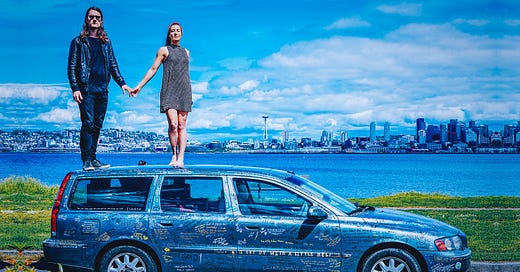Heartland: State of the Unity
An expat Hoosier husband/wife band sets off in 2016 to preach a message of togetherness and turn a dilapidated Volvo into a rolling work of communal art.
For Heartland Film Festival showtimes and tickets, click here.
In 2016 a pair of South Bend, Ind., expats, who also happened to be married to each other and comprise the band The Bergamot, set out in a mechanically questionable Volvo wagon for a 50-state tour aimed at bringing people of different persuasions together, dubbing it the Unity Collective tour.
To call it audacious is an understatement. Jillian Speece and Nathaniel Hoth saw the disquiet and vexation all around them in the runup to the 2016 presidential election. Rather than what most everyone else did — run screaming into tribalist spurts of rage — they decided to do something different: actually try to bring people together.
Their plan was also simple. They would set up ad-hoc gigs to perform wherever they could in every state. Sometimes it would be in a big concert venue. Other times a seedy bar or hole-in-the-wall coffee shop. Often it was simply climbing on top of their car and playing to whatever passersby there happened to be.
Afterward, they would invite people to sign their car with a sharpie, expressing whatever the word “unity” mean to them. The better part of a year later, after many breakdowns — mechanical, emotional and otherwise — unbridled joy and countless encounters later, the car, now a bonafide work of art, was auctioned off for charity.
The Bergamot also filmed each other along every step of the way, with Speece and Hoth acting as directors of the engaging documentary, “State of the Unity.” It’s a combination road trip, time capsule, musical expedition and journey of the soul.
Occasionally they would encounter harsh attitudes or events. Like the burly Texas truck driver who made a nasty quip about the Chinese family signing the car. Or the time their car was broken into in Portland, Ore. (of course), and their expensive audio equipment stolen.
But things for the pair, buoyed by their eternal sense of optimism, had a way of working out. The Texan would up signing the car himself, and a fan who was following their trip made them whole on equipment so they could keep playing.
Speece and Hoth make for compelling subjects-slash-guides, pilgrims creating their own story as they go. Not rich or famous, they’re workaday musicians living in New York City who can at least chase their dreams and claim a following. Jammed into the tiny confines of their aged Volvo, their stuff piled haphazardly in the back — where they sometimes also must resort to sleep when funds run low — these hopeful paladins have joyous adventures most everywhere they go, from New Orleans to Florida to California and even the reaches of Hawaii and Alaska.
If you want to see how they got their car signed in these places despite thousands of miles of air travel, watch and find out.
(They’re also, it must be observed, quite the fetching pair beloved by the camera. I kept wondering how they maintained their chiseled bodies, fresh faces and long dark hair dangling just so while driving for 16-plus hours at a time, subsisting on vending machine fare.)
I do have a few head-scratching questions/complaints about this documentary, as much as I enjoyed it.
Foremost among them is, Why did it take six years to make it to the screen? I know editing takes a lot longer than the average cinephile understands, but I can’t help thinking the movie would’ve had a more visceral impact and sense of immediacy if it had come out in 2018 or ‘19.
The year 2016 seems positively hazy now, like a disturbing dream barely remembered but still with lingering trauma. (Maybe because every one after has been little better for the quest toward unity.)
I also wondered at the choice to keep its perspective apolitical, or approximately so. Though most of the people featured, especially a passel of university professors offering their takes on ‘the meaning of it all,’ would seem easily classified as left-of-center, there’s a curious lack of animus expessed toward Trumpy folks. Of course, this was filmed before they had his actual presidency to get worked up about.
And one final quibble: I wanted more Bergamot music! You’d expect a film like this to passively push the creative work of the artists featured, but we generally only get a few snippets here and there until a brief concert scene at the end. I heard enough of their warm, genre-bending plucking and crooning — Americana would probably describe their sound best — that I was itching for more.
Better to leave ‘em hungry, I guess.
“State of the Unity” is the cinematic journal of a weird, worthy endeavor most people couldn’t even contemplate attempting, then or now. Looking at the current environment, The Bergamot look less like starry-eyed radicals than commonsense pioneers worthy of emulation.





